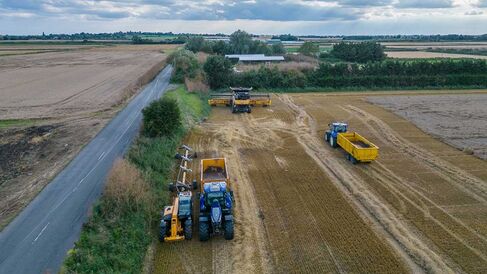Accelerating Climate Solutions: £1 Million Boost for Cambridge's Centre for Landscape Regeneration

Photo By Glynis Pierson
QCF employs a science-led approach to unlocking solutions that reduce climate impacts and lift people out of vulnerability. QCF focuses on the immediate reduction of greenhouse gas (GHG) emissions associated with human activities, scaling methods to remove greenhouse gases from the atmosphere, and responding effectively to climate impacts. The new donation builds on an earlier gift that is already supporting Cambridge Zero, the University’s climate change initiative, and the Centre for Landscape Regeneration (CLR). This support includes measuring GHG emissions to evaluate a range of potential climate change solutions.
“We are exploring how rural land could be regenerated for the benefit of climate, nature, and for the people who live and work in the landscapes,” said Professor Emily Shuckburgh, Director of the CLR and Cambridge Zero. “Identifying solutions will enable the UK to produce food efficiently, reduce carbon emissions, secure water resources, manage flood risks, enrich biodiversity, improve resilience and enable sustainable communities.”
According to the IPCC (Intergovernmental Panel on Climate Change), land use contributes about one quarter of global GHG emissions, so changing the way we use our land to bring down emissions could have a significant impact. To identify and deploy the best solutions for any landscape, we need robust underpinning measurement of the associated GHG emissions. This is one of the principal aims of the CLR’s research in the Cambridgeshire Fens, where the highly fertile lowland peat soil provides a third of England’s fresh vegetables, while being a hotspot of land-use related GHG emissions.
QCF’s donation has enabled CLR researchers to erect two flux towers, specialised items of equipment, which are monitoring GHG emissions under different land-use regimes. CLR researchers are also developing two innovative types of low-cost GHG sensors. By incorporating further research on soil processes, microbes and biodiversity, the aim is to create a rich picture of the impacts of land use and options for potential climate solutions.
“In our commitment to confronting the climate change challenge, supporting science and research is paramount... by advancing robust measurement and innovative solutions, we aim to drive impactful climate action and create a resilient future for vulnerable communities.”
said Greg De Temmerman, Deputy CEO and Chief Science Officer at QCF.
Increasing our climate resilience also requires public understanding and confidence in the behaviours we need to change in our own lives. Cambridge Zero Research Fellow Dr Ramit Debnath is collaborating with Google and New York University in a ‘big data’ project that collects online information on public trust, perception and attitudes to global climate action, with the aim of building tools and techniques to improve public attitudes towards climate change.
With the support of QCF, these initiatives will harness the research and policy expertise in the University of Cambridge to accelerate the collaborative development of solutions for reducing human-induced GHG emissions and encourage the public to mobilise for change.
